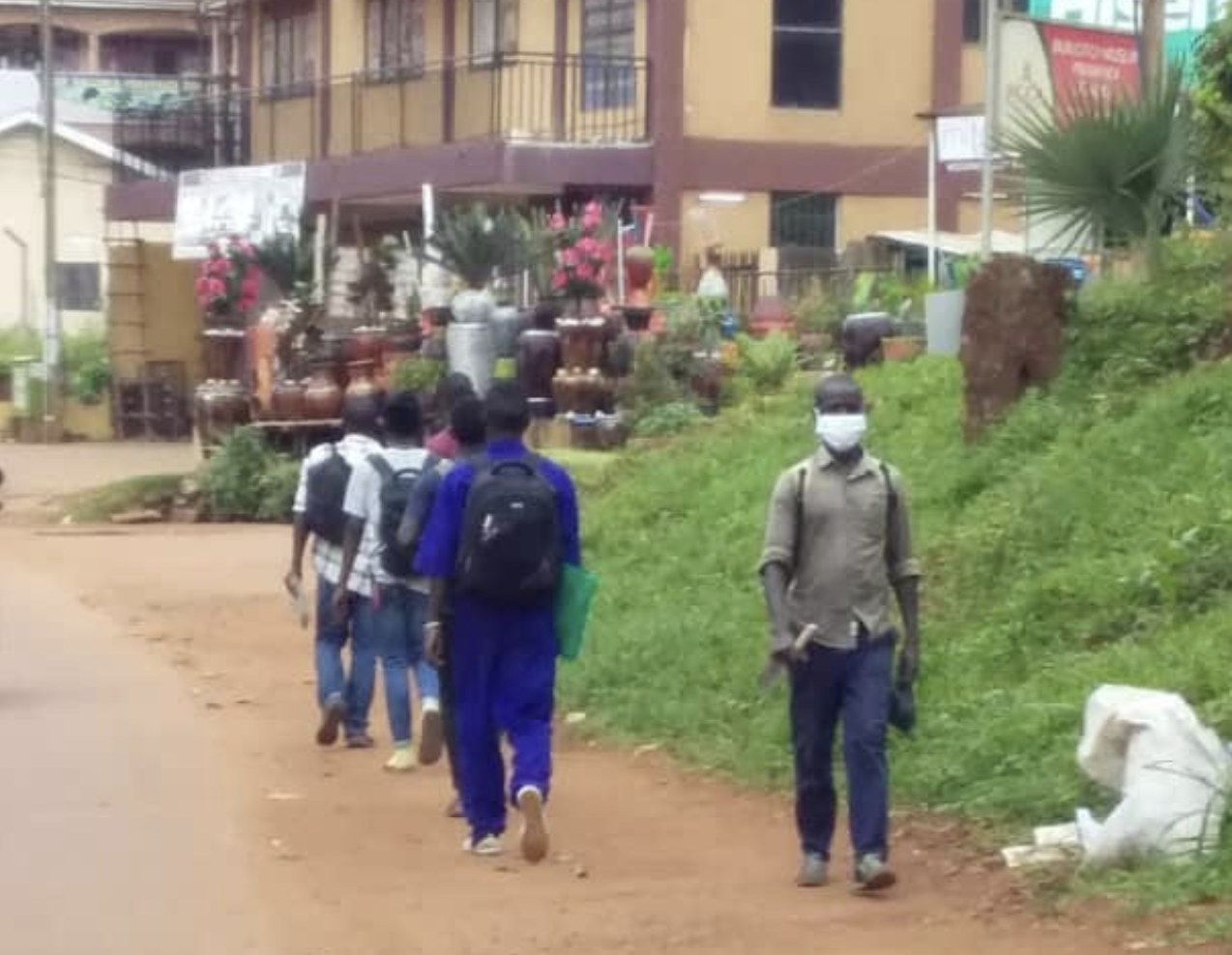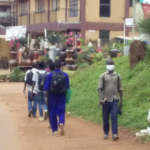
Reports from the Field are perspectives from curators from around the world, who are alumni of the Curatorial Intensive, ICI's professional development program for emerging curators. The commissioned texts are reflections on the impact of the global pandemic on their lives, ways of working, their communities, and how they are adapting as a response.
Balimunsi Philip, Alumnus of the Curatorial Intensive Addis Ababa '14, writes from Kampala, Uganda. To read and download the PDF version, click here.
Collective Memories
Photo by: Akiiki Paulo *Detailed description in footnote.
The nobility of relations between African art and universal values traditionally sought comfort in indefinable spaces. Art is the greatest social fact to interrogate social realities that COVID-19 has reimagined into a long-distance treasure. Life in Uganda is a reimagined performative installation vested on a bundle of relations facilitated by human physical conversations. It’s such an amazing musical composition with tremendous discordant sounds in jarring juxtaposition.
Ugandan narratives seem shaky in a conventional context but traditionally profound and original, though threatened by social distancing in the recent context of “open migration” and “free movement”. The traditional and rich African chain of oral transmission and physical dialogue seems problematic and impossible in the midst of COVID-19. This has proved strong advocacy for high-speed internet to facilitate virtual spheres of conviviality. Hasn’t the scaffold upon which people strategically stand as culture documentation infrastructure been shaken by social distancing? What a country of great orators Uganda has been from generation to generation! With people as libraries, memory disks, and digital databases for ages, oral freedom seems to have traditionally undermined the “New” arena for conversations. Despite a high youthful population, such a belief puts into perspective the discussion of the highly problematic social media taxes, Over The Top (OTT) payable by everyone nursing desires to use social media platforms within Uganda.
As a curator with tremendous interest in Ugandan history in relation to contemporary practice, my life lies beneath archives, and in between gallery walls is a place I call home. Our inability to effectively reach out to artists and other cultural players through physical studio visits and broadcasts finds no refuge in the virtual world of unstable and slow internet connections: I am digitally confined and intellectually constrained in the middle of nowhere. “The lockdown is not a matter of convenience, we’re talking about life and death. This is ‘war’! this is a time for survival”, the president of Uganda asserted as he extended the total lockdown on May 2, 2020.
My ability to pack a century of pains in isolation and meditation was constrained by the mandatory self-quarantine I was recommended to exercise. Not even the prestigious interview with Elimo Njau in Nairobi, Kenya would shape my confidence into a weapon to assail the stigma from COVID-19 in the first weeks of self-quarantine, before doctors draped in protective equipment turned up for blood samples. For the first time in the history of Uganda, traveling was greeted with disdain! Hasn’t life just crawled deep into burnt orange-scented Dingy Taverns? Such traumatic realities only fueled Nosophobic mistreatment to send ceaseless reels of intellectual uncertainty brooded over in search of sanity.
Imagine an African city without people, it’s like a body without a soul. Utopia seems a costly political satire for Uganda where creativity for survival defines the infrastructural outlook of cities. This explains the heavy traffic build-ups and the logical existence of “Boda Bodas” and “Matatus” in Kampala. Dangerous as they may seem, they define the true spirit of the city during normal business days and thus prove a reliable platform for unemployed youths. Therefore, grounding public transportation during the national lockdown confined commuters to their own homes and rendered Uganda an online economy perched on an imaginary uptown population whose supplies are procured from local downtown traders by online distributors.
Imagine, an online delivery chain without suppliers! Order cancellation seemed inevitable. Tourism, arts, and culture have totally been mired down by COVID-19; the concept of social distancing left no option but cancellation or postponement of live events until further notice. With online engagement still limited to a few with access to smartphones, internet, and social media; television and broadcast have emerged new social entertainment heroes. However, starvation, high prepaid costs of electricity, and television subscription, without income and coupled with regular load shedding, still confine entertainment to the privileged. When television seized the lockdown with live discotheques, performances, and celebrity interviews, it focused on music and neglected film, poetry, literary and visual arts otherwise experienced by audiences at biennials, festivals, pilgrimages, galleries, and museums.
Cultural tourism was shellacked, as transportation was limited to cargo. The soaring number of patients in Kenya, Tanzania, and Rwanda have overwhelmed Uganda with sick truck drivers hence frantic with worry upon handling a subject that has mired the country into an unending lockdown. Strict and regular patrolling to restrict truck drivers from community contact seems insidious due to the polygamous nature of drivers in question.
Being physically confined, we’ve truly been intellectually hurt but digitally liberated. Our cultural contribution is perched on the incredible powers to heal the world; this requires therapy and mettle to scaffold creativity necessary for an institutional restructuring of public engagement. Uganda ought to rethink the internet as a basic human need for its urban population. COVID-19 has rendered gatekeepers to African national memory (elderly) immediate victims; therefore, cultural centers ought to intensify documentation, digitization of collections, and online access to project fragments of forgotten experiences that inform creative realities.
Bobi Wine and Nubian Li during the Ensasage Mu Nyumba concert that was held in Magere over Mother's Day Weekend
The intellectual superiority of Ugandan artists has been tested during COVID-19. A number of online performances, debates, and conferences have been conceived to address the “new normal”. UNESCO ResiliArt Webinar Debates triggered countless structured discourses not only on culture but also comprehensively on the entire economy; a resiliArt chapter was created by the Ministry of Gender, Labour and Social Development, and Private Sector Foundation Uganda (PSFU) and organized a successful e-conference broadcast live on NBS television. The most excruciatingly exciting online success that might revolutionize performance with punctual and committed online audiences was the live Facebook mothers’ day performance titled “Ensasage mu Nyumba” (or “Chaos in the house” in Luganda) staged by Hon. Robert Kyagulanyi, commonly known as Bobi Wine, at his Magere residence. Many online conferences, debates, symposia, and performances still struggle to find an online footing in spaces of public engagement. Nevertheless, culture must survive in the midst of a ferocious catastrophe no matter the challenges that have seemingly marred all online efforts.
Fotenote:
1) Image Caption: Workers treking to workplace at Ntinda, Kampala – Uganda. No public transport was allowed to carry passengers and everyone had to walk or but a bicycle but many were manual workers or casual labourers with small wages, that had to walk. Only essential workers; food market vendors, health workers and construction site workers were allowed to move and work.





